Why Choosing the Right Morgue Cooler is Critical for Your Facility
Morgue-coolers- are specialized refrigeration units designed to preserve human remains by maintaining precise temperatures between 36°F and 39°F (2°C to 4°C). These essential systems slow decomposition and provide families the time they need to make funeral arrangements with dignity and care.
Key morgue cooler types and capacities:
- Body box coolers: Store 1-6 bodies, starting around $6,095 for 2-body units
- Walk-in coolers: Hold 9-50+ bodies with customizable rack systems
- Roll-in units: Accommodate bodies on mortuary cots, typically 2-3 capacity
- Custom units: Built to exact specifications for space-constrained facilities
Most modern units are 100% self-contained, plugging into standard 110V outlets with no special electrical requirements. They feature 4-inch thick insulated panels for energy efficiency and digital temperature controls for precise monitoring.
When a funeral home director recently told us, "It is literally a game changer in the funeral industry," they were describing how the right morgue cooler transforms both operational efficiency and the quality of care provided to grieving families.
As American Mortuary Coolers, a Tennessee-based mortuary cooler specialist, we've helped hundreds of funeral homes and medical facilities select the perfect refrigeration solutions for their specific needs. Our expertise in morgue-coolers- spans everything from compact 2-body units to large walk-in systems with advanced monitoring capabilities.
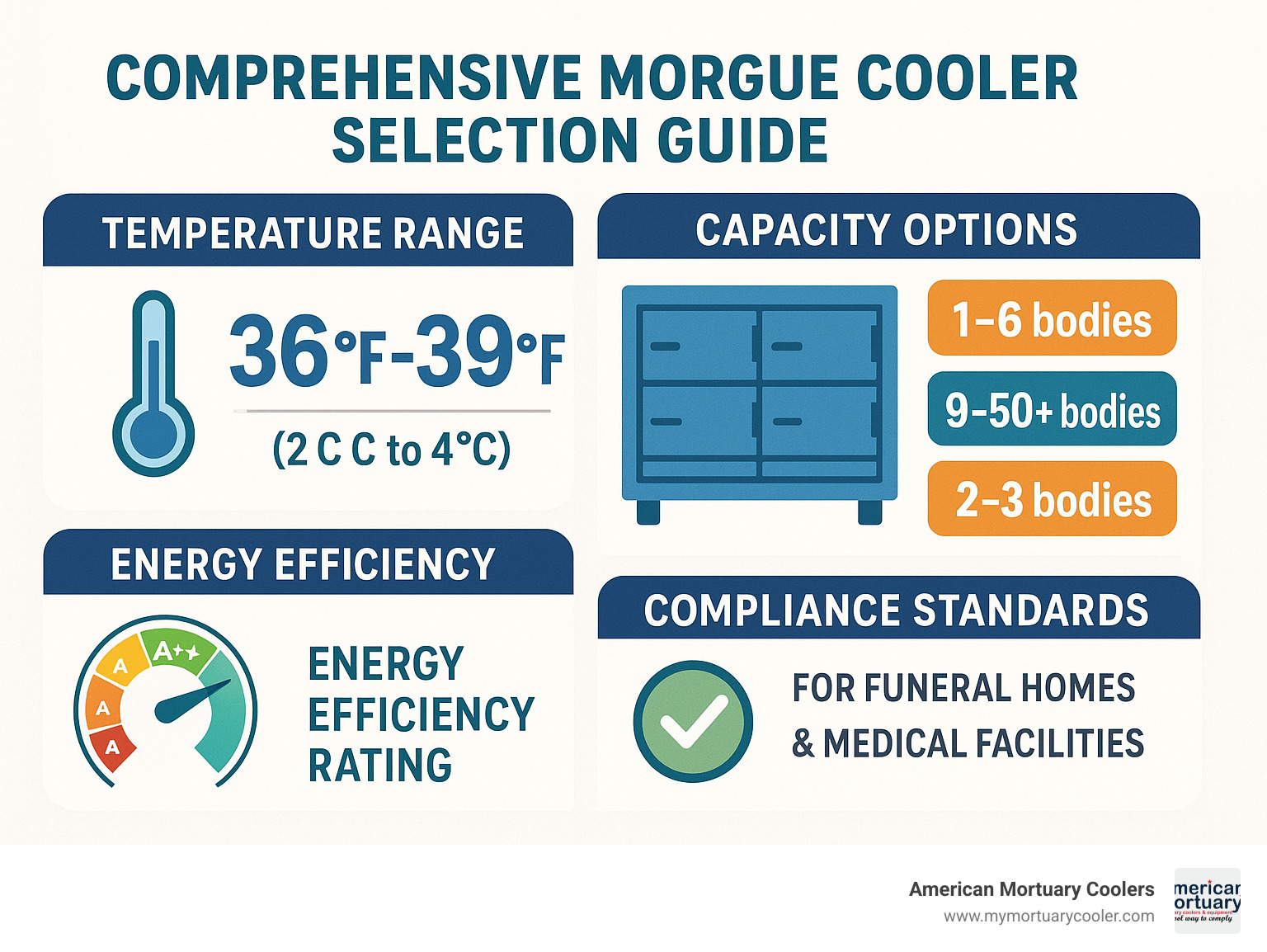
Understanding morgue-coolers-
Think of morgue-coolers- as specialized guardians that slow down time itself. These remarkable refrigeration systems work around the clock to preserve human remains by maintaining precise temperatures between 36°F and 39°F (2°C to 4°C). It's a simple concept with profound importance—giving families the precious gift of time during their most difficult moments.
The science behind these units is both straightforward and fascinating. Most morgue-coolers- operate using positive temperature settings, which effectively slow decomposition without freezing the body. This gentle preservation method maintains the natural appearance and dignity of the deceased while preventing the rapid breakdown that would otherwise occur within hours to days.
However, some specialized facilities require a different approach entirely. Negative temperature units operating between -10°C to -50°C serve forensic institutes and medical facilities that need long-term preservation for investigations or research. These powerful systems can preserve remains for extended periods when circumstances demand it.
The industry has evolved tremendously over the years. Today's body box morgue coolers range from intimate single-body units perfect for smaller funeral homes to impressive 15-body capacity systems that can handle significant volume. Meanwhile, walk-in mortuary coolers offer even more flexibility, with custom configurations accommodating anywhere from 9 bodies up to 50 or more, depending on how the rack system is designed.
For a deeper dive into your options, check out Different Types of Mortuary Coolers.
What makes morgue-coolers- essential?
Here's a reality that's both sobering and important to understand: when someone passes away, the human body begins its natural decomposition process remarkably quickly. Without proper refrigeration, noticeable changes can occur within hours to days, though in rare cases, natural preservation might extend this timeline to a few weeks.
This biological reality creates an urgent need that goes far beyond simple sanitation. Morgue-coolers- become lifelines for grieving families who need time to process their loss, gather loved ones from distant places, and make thoughtful funeral arrangements without the pressure of a ticking clock.
Legal timelines add another layer of complexity. Many jurisdictions have specific requirements for how long bodies must be preserved and under what conditions. Meeting these regulations isn't just about compliance—it's about protecting families and facilities from additional stress during already difficult times.
For hospital workflow, these systems are absolutely critical. Medical facilities must manage capacity efficiently, especially during surge situations like natural disasters or health emergencies. A reliable morgue cooler system ensures smooth operations while maintaining the dignity and care every person deserves.
There's another vital role these systems play that many people don't realize: supporting organ transplant programs. By keeping internal organs viable for transplant procedures, morgue coolers literally help save lives even after death.
How do morgue-coolers- work?
The magic happens through fundamental heat transfer principles that have been refined over decades. These systems use high-quality compressors and refrigeration units to maintain rock-solid consistent temperatures while continuously removing heat from the storage chamber.
The real secret lies in the construction. Most modern morgue-coolers- feature 4-inch thick insulated panels with impressive R-value ratings. This isn't just about energy efficiency (though that's important too)—it's about temperature stability that you can count on 24/7. These panels typically use polyurethane insulation, which dramatically improves both the cooler's lifespan and performance compared to older insulation materials.
Inside these sophisticated systems, you'll find self-contained refrigeration units equipped with digital thermometers and adjustable temperature controllers that give you precise control. The heavy-duty chrome-plated hardware is designed to withstand the demanding environment of mortuary facilities, while vapor-proof LED lighting ensures visibility and meets strict hygiene compliance standards.
Safety isn't an afterthought—it's built right in. Every unit includes safety release handles that meet OSHA requirements for enclosed spaces, ensuring that anyone accidentally trapped inside can get out safely.
For those interested in the technical details behind refrigeration efficiency, you can explore more at Scientific research on refrigeration efficiency.
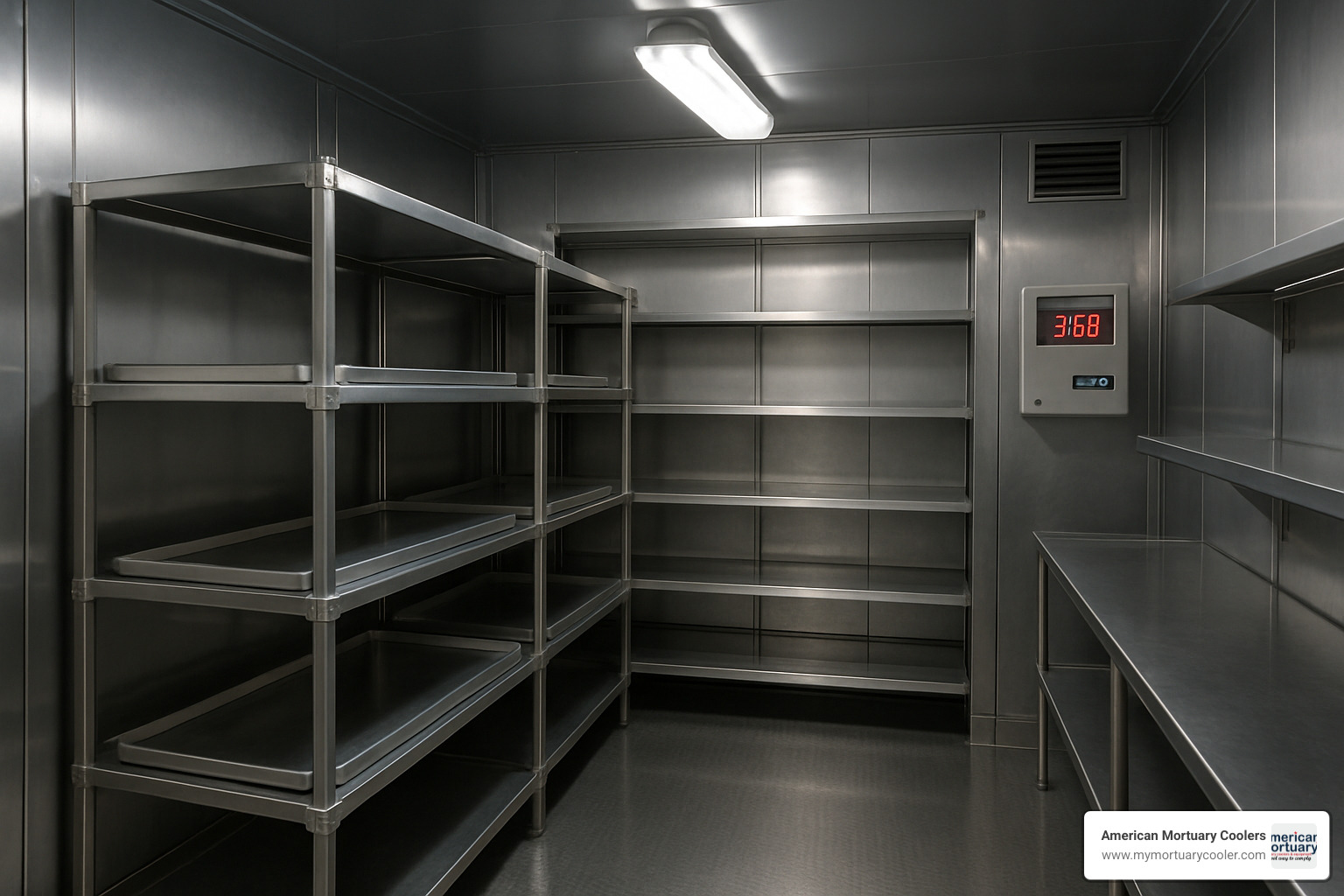
Key Criteria for Choosing the Right Unit
Choosing the perfect morgue-coolers- for your facility isn't just about finding the cheapest option—it's about investing in equipment that will serve your community with dignity and reliability for years to come. After helping hundreds of funeral homes and medical facilities make this decision, we've learned that the most successful installations happen when you plan carefully from the start.
The foundation of any good morgue cooler is capacity planning. You'll need to think beyond just your current needs and consider future growth. A funeral home handling 50 cases annually has very different requirements than a hospital morgue managing 200+ cases. Don't forget to factor in surge situations—holidays, flu seasons, or unexpected events can temporarily increase your storage needs.
Insulation quality makes a huge difference in both performance and operating costs. Look for units with high R-value, 4-inch thick panels. Yes, better insulation costs more upfront, but it pays for itself through lower energy bills and more consistent temperatures. We've seen facilities cut their cooling costs by 30% or more just by choosing properly insulated units.
Construction materials matter more than you might think. Stainless steel interiors aren't just about looks—they're easier to clean, resist corrosion, and meet health department requirements. The seamless construction also prevents bacteria growth, which is crucial for maintaining sanitary conditions.
Modern digital controls have revolutionized morgue cooler operation. Gone are the days of guessing temperatures or manual monitoring. Today's systems offer precise temperature control, data logging, and even remote monitoring capabilities. Some units can send alerts to your phone if temperatures drift outside safe ranges.
Safety features aren't optional—they're legally required in most areas. OSHA-compliant release handles ensure anyone accidentally locked inside can get out safely. It might seem unlikely, but safety regulations exist for good reasons.
Finally, compliance with NSF, UL, and local health department standards protects both your facility and your license. Don't cut corners here—non-compliant equipment can lead to failed inspections and costly retrofits.
For detailed temperature management requirements in your area, check out The Complete Guide to Morgue Cooler Temperature Standards.
Features checklist
When you're comparing morgue-coolers-, it's easy to get overwhelmed by all the options. Here's what really matters for most facilities:
Self-contained, plug-in operation should be your starting point. The best units plug into standard 110V outlets without requiring special electrical work. This keeps installation costs down and gives you flexibility in placement.
Bariatric accommodation has become increasingly important. Modern morgue coolers should handle oversized remains with wider doors and reinforced construction. This isn't just about current needs—it's about being prepared for all situations with dignity.
Temperature alarms and alerts provide peace of mind that's hard to put a price on. Digital monitoring with both audible and visual alerts means you'll know immediately if something goes wrong, even if it happens overnight or on weekends.
Antimicrobial surfaces make cleaning easier and more effective. Seamless fiberglass or stainless steel interiors eliminate the nooks and crannies where bacteria love to hide. This isn't just about meeting health codes—it's about maintaining the respectful environment families deserve.
Advanced features like telescoping sliding trays make daily operations smoother and safer for your staff. Modular panel construction might seem like overkill until you need to relocate or expand—then it becomes invaluable.
Some facilities benefit from WiFi connectivity and remote monitoring, especially larger operations or those with multiple locations. Being able to check temperatures from anywhere and access 30-day temperature histories can be incredibly useful for compliance and troubleshooting.
Positive vs. Negative Temperature Coolers
The temperature range you choose for your morgue-coolers- depends entirely on how long you typically need to store remains and what type of facility you operate.
Positive temperature coolers operating between 36°F and 39°F handle the vast majority of funeral home and hospital needs. They're perfect for storage duration of days to weeks, which covers most typical cases. The energy costs stay reasonable, and bodies remain flexible for preparation procedures. Most funeral directors find these units meet their needs perfectly.
Negative temperature coolers running from -10°F to -50°F serve specialized forensic needs and long-term storage requirements. Medical examiner offices, research facilities, and forensic institutes often need this capability for cases that might remain open for months or years. The trade-off is significantly higher energy consumption and operating costs.
The cost impact between these options can be substantial. Negative temperature units require more robust refrigeration systems, better insulation, and consume considerably more energy. We typically see operating costs that are 2-3 times higher for negative temperature units.
Most facilities start with positive temperature units and add negative temperature capability only when specific needs arise. This approach keeps initial investments manageable while ensuring you can handle standard operations effectively.
Sizing, Energy & Cost Calculations
Proper sizing of morgue-coolers- requires careful analysis of your facility's current and projected needs. We recommend starting with a thorough assessment of your typical caseload, peak capacity requirements, and available space.
Capacity Planning Factors:
- Average monthly body count: Review 12-24 months of historical data
- Seasonal variations: Account for flu season and other peak periods
- Emergency surge capacity: Plan for 150-200% of normal capacity
- Future growth projections: Consider facility expansion and service area growth
Space Configuration Options:
- Body box units: 2-15 body capacity, compact footprint
- Walk-in coolers: 9-50+ bodies with rack systems, larger footprint
- Modular panels: Allow for future expansion with minimal disruption
Climate zone significantly impacts energy consumption. Facilities in hot, humid climates will see higher operating costs, making superior insulation even more valuable. Units with high R-value insulation can reduce energy consumption by 20-30% compared to standard insulation.
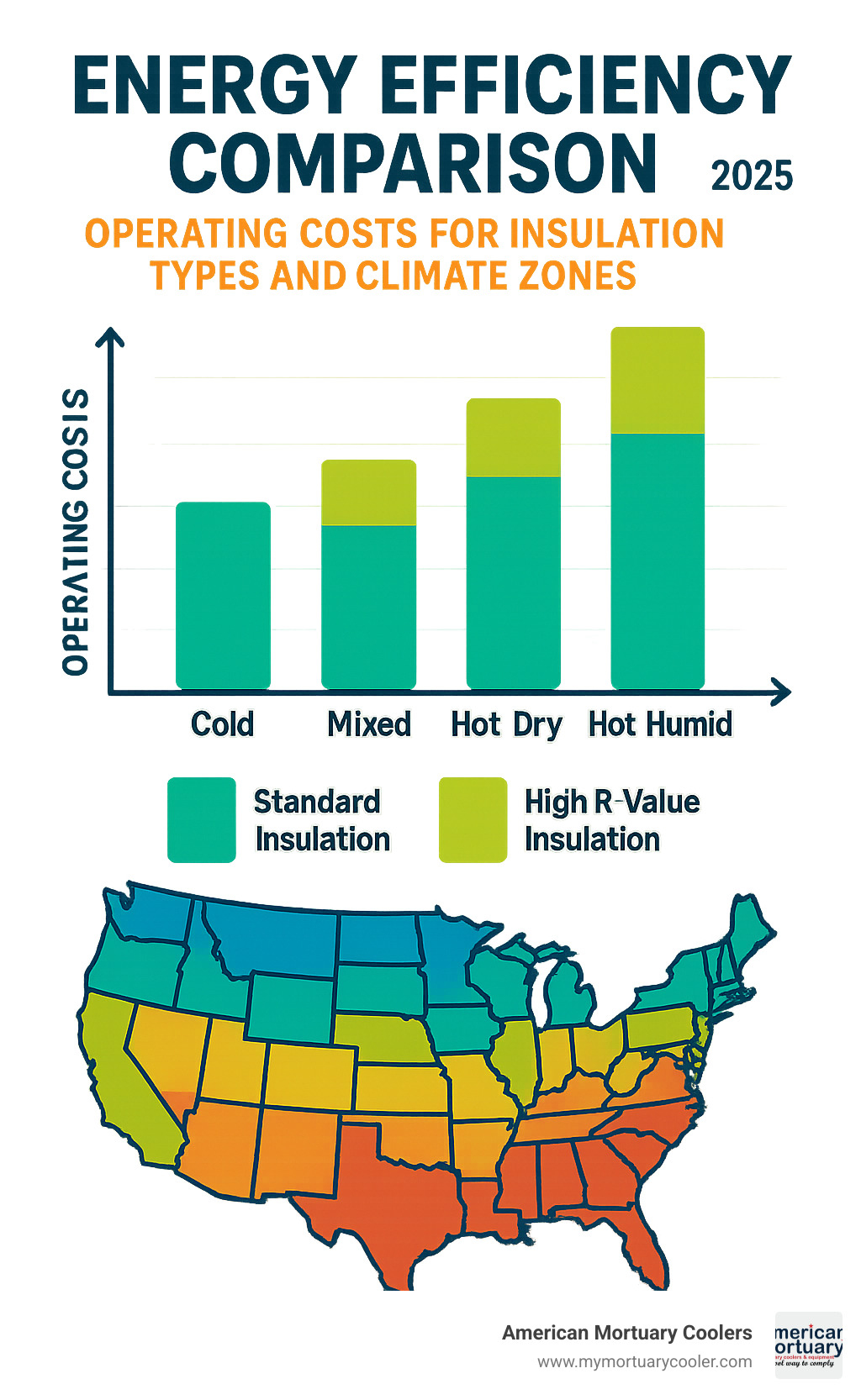
Estimating capacity & footprint
To accurately size your morgue-coolers-, start by calculating your facility's square footage requirements and storage density needs.
Footprint Calculations:
- Standard body tray: 23", 27", or 30" width options
- Aisle space: Minimum 36" for safe movement and equipment access
- Rack systems: Cantilever racks maximize vertical storage
- Future expansion: Leave 25% additional space for growth
Storage Density Options:
- Single-tier storage: Maximum accessibility, larger footprint
- Multi-tier systems: Up to 5-tier configurations for space efficiency
- Cantilever racks: Adjustable height and spacing for flexibility
Consider your facility's workflow patterns when planning layout. Roll-in units work well for facilities that transport bodies on mortuary cots, while upright units with removable trays suit facilities with lifting equipment.
Budgeting & ROI
Morgue-coolers- represent a significant capital investment, but proper selection delivers strong returns through energy savings, reduced maintenance, and improved operational efficiency.
Initial Investment Ranges:
- 2-body box cooler: $6,095 (standard model)
- 4-body box cooler: $9,049 (standard model)
- Walk-in systems: $15,000-$75,000+ depending on size and features
- Custom configurations: Quote-based pricing for specialized requirements
Operating Cost Factors:
- Energy consumption: Varies by insulation quality, climate, and usage patterns
- Maintenance requirements: Quality units require minimal service
- Warranty coverage: Look for 15-year panel warranties and 5-year mechanical warranties
High-quality insulation pays for itself through reduced energy costs. For detailed efficiency research, see Latest research on high-R insulation.
ROI Considerations:
- Energy savings: 20-30% reduction with superior insulation
- Maintenance savings: Quality construction reduces service calls
- Operational efficiency: Better workflow reduces labor costs
- Compliance benefits: Avoid fines and regulatory issues
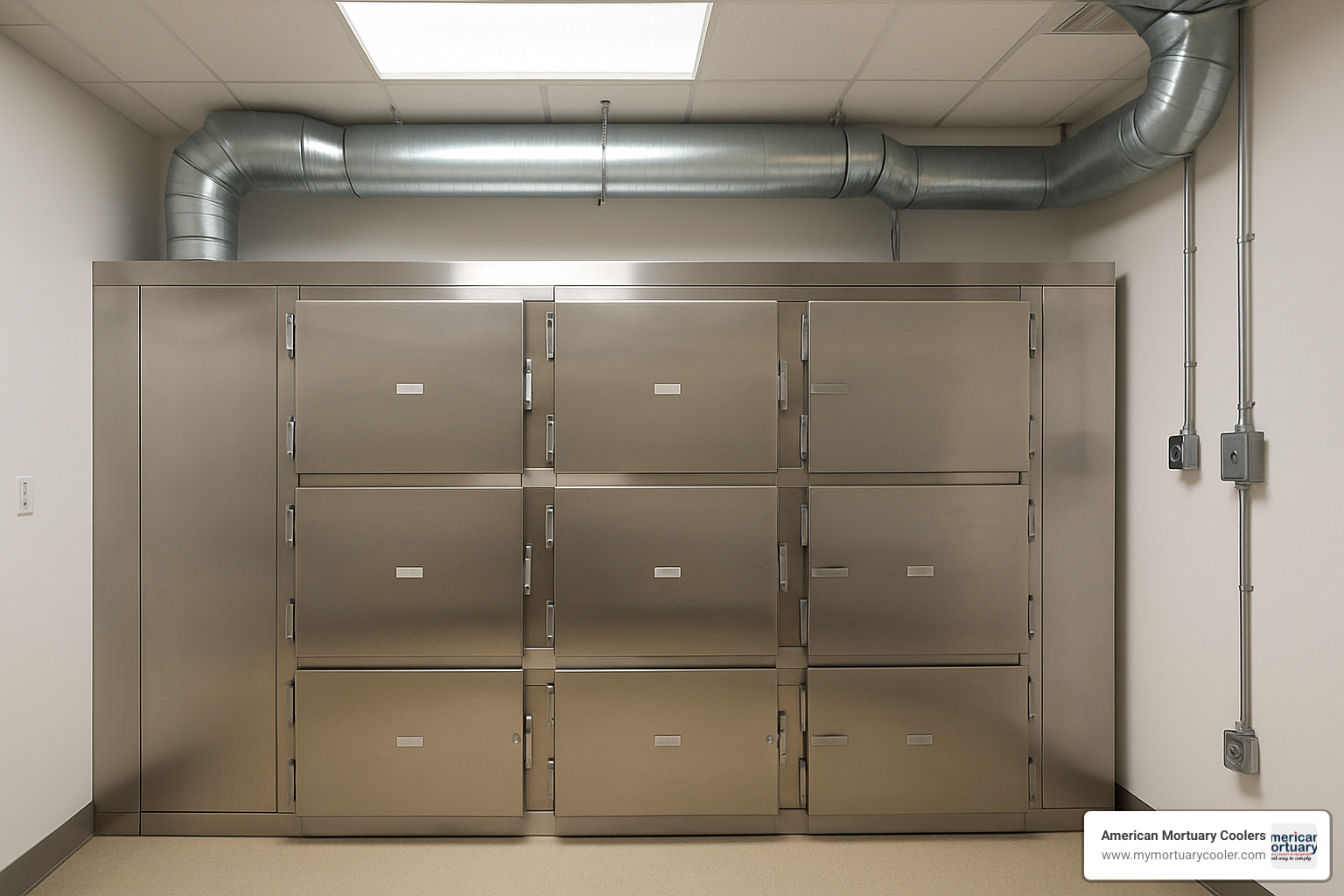
Installation, Maintenance & Compliance
Getting your morgue-coolers- up and running properly is just as important as choosing the right unit. We've walked hundreds of facilities through this process, and the installations that go smoothest are always the ones where someone took time to plan ahead.
The good news? Most modern morgue coolers are designed to make installation as straightforward as possible. Many of our smaller units arrive fully assembled and ready to plug in. You'll typically need a standard 110V electrical outlet, though larger walk-in systems might require 220V service.
Site preparation doesn't have to be complicated, but getting a few basics right will save you headaches later. Your floor needs to be level and able to handle the weight - concrete is ideal. Make sure there's adequate ventilation around the condensing unit so it can breathe properly. And don't forget about access - you'll need enough clearance for delivery trucks and future service calls.
One thing that surprises some facility managers is how important proper drainage becomes during cleaning. These units need regular sanitization, and having a floor drain nearby makes the job much easier. If you're installing in a basement or area without drainage, plan for that water to go somewhere.
For facilities in specific states, regulations can vary significantly. Our guide on Morgue Cooler Requirements in Washington State gives you an idea of what state-level requirements might look like.
Routine maintenance tasks
Here's something that might surprise you: morgue-coolers- are actually pretty low-maintenance when you buy quality equipment. But like any mechanical system, a little regular attention goes a long way toward preventing bigger problems.
Coil cleaning is probably the most important task you'll do. Dust and debris love to collect on evaporator and condenser coils, and when they do, your unit has to work harder to maintain temperature. A simple brush-down every few months keeps things running efficiently. You'll notice the difference in your energy bills.
Gasket inspection might seem minor, but those rubber door seals are your first line of defense against temperature loss. Run your hand around the door frame - if you feel any air leaks, it's time for replacement. A worn gasket can increase energy costs by 15-20%.
Don't forget about your temperature logs. Most modern units keep digital records, but it's worth reviewing them regularly. Sudden temperature swings often signal problems before they become failures. We've helped facilities catch compressor issues early just by noticing temperature patterns in the data.
The temp-log audit process is simpler than it sounds. Look for consistent temperatures within your target range, smooth cooling cycles, and no unusual spikes. If something looks off, call for service before you have a crisis.
Meeting safety standards
Safety compliance isn't just about avoiding fines - it's about protecting your staff and maintaining the dignity of the families you serve. The regulations might seem overwhelming at first, but they're built on common sense principles.
OSHA release handles are probably the most visible safety feature. These interior handles allow someone to exit from inside the cooler if they accidentally get locked in. It sounds dramatic, but it happens more often than you'd think, especially during cleaning or maintenance. Make sure your staff knows where these handles are and test them regularly.
NSF seamless surfaces serve a dual purpose - they prevent bacterial growth and make cleaning much easier. When you're evaluating units, look for smooth, continuous surfaces without cracks or crevices where contaminants can hide. Stainless steel interiors are gold standard here.
UL listing covers the electrical safety aspects. This certification means the unit has been tested for proper wiring, grounding, and fire safety. It's not just a nice-to-have - many insurance companies and local authorities require it.
The cleaning protocols themselves are straightforward but critical. Use approved disinfectants and follow manufacturer guidelines. Some facilities create detailed cleaning checklists to ensure consistency across different staff members.
Record-keeping ties everything together. Document your maintenance, cleaning, and temperature logs. If an inspector shows up, or if you need warranty service, having organized records makes everything go smoother. Plus, good records help you spot patterns and prevent problems before they start.
Frequently Asked Questions about Morgue Coolers
We get dozens of questions every month from funeral directors, hospital administrators, and medical facility managers looking for the right morgue-coolers- solution. After helping hundreds of facilities across 48 states, we've noticed the same three questions come up again and again. Let's explore the answers that matter most for your facility.
How cold should a morgue cooler be?
The sweet spot for most morgue-coolers- is between 36°F and 39°F (2°C to 4°C). This temperature range works like a charm for standard body storage, slowing decomposition effectively while keeping bodies flexible enough for preparation procedures.
Think of it this way: too warm, and decomposition accelerates rapidly. Too cold, and bodies become rigid, making preparation work much more difficult for your staff.
But here's where it gets interesting. Forensic facilities tell a different story. They often need negative temperature units that operate between -10°F to -50°F (-23°C to -46°C) for long-term evidence preservation. These super-cold units are essential when bodies need to be stored for months or even years during complex investigations.
The specific temperature your facility needs depends on how long you typically store bodies and what type of work you're doing. Most funeral homes find that positive temperature morgue-coolers- handle their needs perfectly.
What size morgue cooler do I need?
Sizing your morgue cooler right is crucial, and we've learned that most facilities benefit from planning bigger than they think they need. Here's what we typically recommend based on facility type:
Small funeral homes usually do well with 2-4 body capacity units. These compact systems fit nicely in tight spaces while handling typical caseloads. Our 2-body units starting at $6,095 are popular choices for smaller operations.
Medium-sized facilities often need 6-12 body capacity to handle busier periods comfortably. Walk-in systems start making sense at this level, giving staff easier access and better workflow.
Large facilities and hospitals typically require walk-in systems with 20-50+ body capacity. These custom-built units use rack systems to maximize storage while maintaining easy access.
Here's the key insight we share with every client: size for 150-200% of your normal capacity. Flu season, accidents, and unexpected events can quickly overwhelm undersized systems. It's much better to have extra space you don't always need than to scramble during peak periods.
Consider both your current needs and where your facility might be in five years. Expanding morgue capacity later is possible but much more expensive than getting it right the first time.
Can I rent a mobile morgue cooler in an emergency?
Absolutely, and it's a lifesaver when you need it most. Mobile morgue-coolers- are available for rental during emergency situations, and we've seen facilities use them successfully in various scenarios.
Polar Leasing and other specialized companies offer mortuary coolers and freezers for temporary cold storage needs. These mobile units become essential during mass casualty events, equipment failures, facility renovations, or unexpected seasonal capacity increases.
The rental options range from 2-body portable units that can fit through standard doorways to large trailer-mounted systems capable of storing dozens of bodies. Some facilities keep rental company contact information handy as part of their emergency preparedness planning.
We've seen funeral homes use mobile units during their busiest seasons, hospitals rely on them during equipment maintenance, and entire regions deploy them during natural disasters. The peace of mind knowing this backup option exists is invaluable.
The key is planning ahead and establishing relationships with rental companies before you need them. During true emergencies, mobile units get reserved quickly, so having those contacts ready makes all the difference.
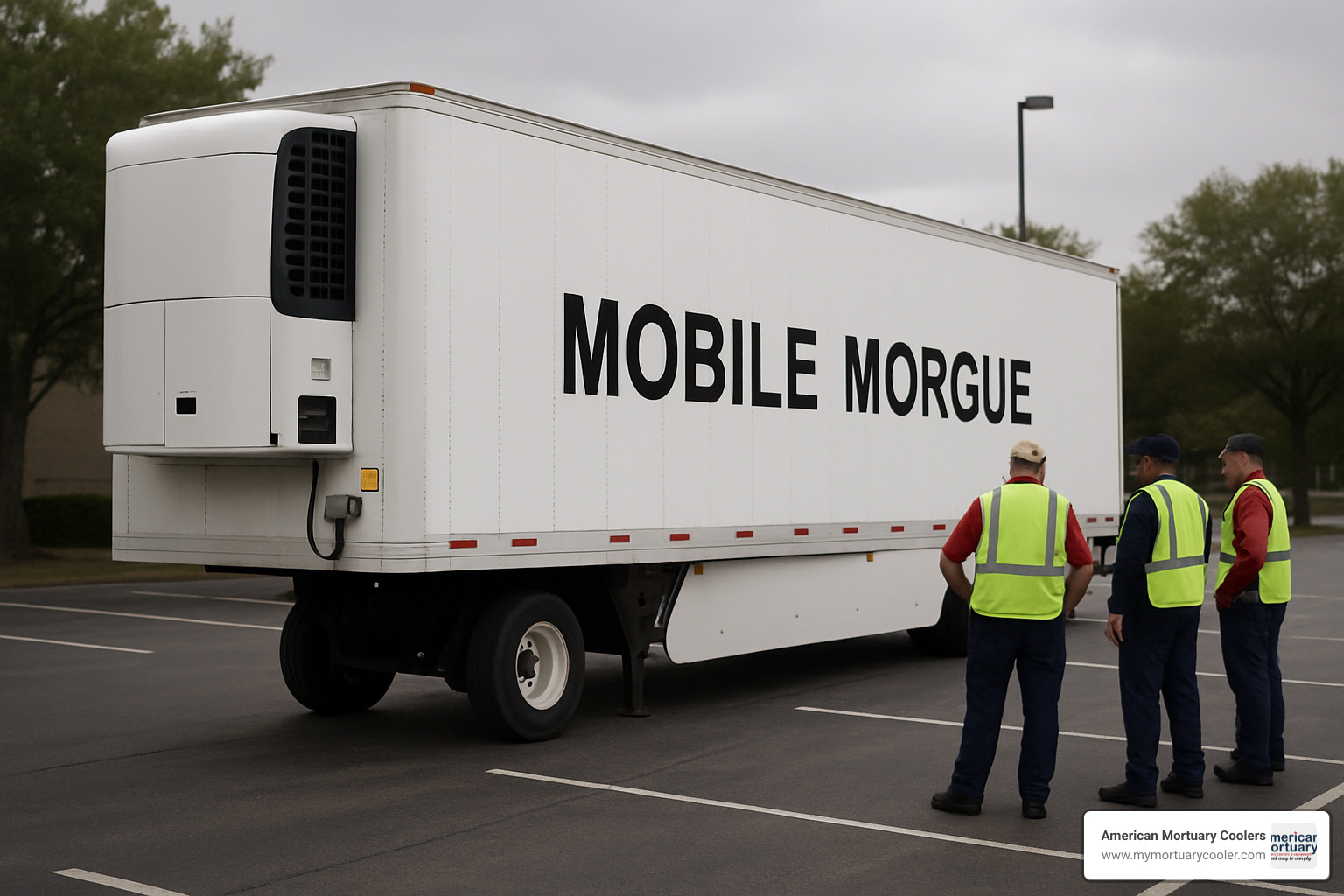
Conclusion
Selecting the right morgue-coolers- requires careful consideration of capacity needs, energy efficiency, compliance requirements, and long-term operational costs. The investment in quality equipment pays dividends through reliable performance, energy savings, and the peace of mind that comes from providing dignified care to families during their most difficult times.
At American Mortuary Coolers, we specialize in crafting custom mortuary coolers and related equipment custom to each facility's unique requirements. Our Tennessee-based operation delivers durable, reliable solutions with direct delivery across the contiguous 48 states, from our locations spanning Johnson City TN to Los Angeles, New York to Dallas.
Key decision factors to remember:
- Capacity planning: Size for current needs plus 25-50% growth
- Energy efficiency: High R-value insulation pays for itself
- Compliance: Ensure NSF, UL, and OSHA requirements are met
- Maintenance: Quality construction reduces long-term costs
- Customization: Tailor features to your specific workflow needs
Whether you need a compact 2-body unit for a small funeral home or a large walk-in system for a major medical facility, the right morgue-coolers- will serve your community with dignity and reliability for years to come.
Ready to find the perfect morgue cooler for your facility? Contact us today to discuss your specific requirements and receive a custom quote. For additional guidance on advanced features and future innovations, explore The Definitive Guide to Morgue Coolers: Selection, Operation, and Future Innovations.


















